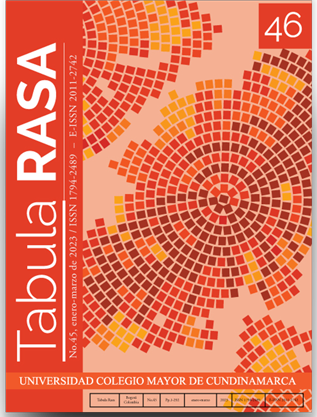The Gender of Race: Fanon as a Reader of Beauvoir
El género de la raza: Fanon, lector de Beauvoir
Show authors biography
Frantz Fanon’s Black Skin, White Masks and Simone de Beauvoir’s The Second Sex display numerous theoretical and critical affinities. These stem from the appropriations and translations which both works operated in relation to the Hegelian dialectic of master and slave, with a view to the conceptual apprehension of relations of gender (man/woman) and race (White/Black). From this starting-point, what is engaged is a comprehensive dialogue on the questions of the body (gendered, racialised), love, and violence. However even more than these affinities, what we can identify is the extent of the influence of Beauvoir’s writings on Fanon. If this aspect has for the moment come in for very little emphasis and even less study, it is because Fanon never quotes Beauvoir’s theses and would even appear to have striven to hide any intellectual filiation. We need to understand the causes of such a “disappearance”, not only to comprehend Fanon’s work, but also so as to understand their shared source, which is also, to a certain degree, a shared birth, that of feminism and anti-colonialism in the years following the Second World.
Article visits 236 | PDF visits 50
Downloads
- Balibar. E. (2005). La construction du racisme. Actuel Marx, 38(2), 11-28.
- Beauvoir, S. (1997). Lettres à Nelson Algren. Un amour transatlantique, 1947-1964. Paris: Gallimard.
- Beauvoir, S. (1976a). Le Deuxième Sexe. I — Les faits et les mythes. Paris: Gallimard.
- Beauvoir, S. (1976b). Le Deuxième Sexe. II — L’Expérience vécue. Paris: Gallimard.
- Beauvoir, S. (1947). L’Amérique au jour le jour. Paris: Gallimard.
- Beauvoir, S. (1966). Pour une morale de l’ambiguïté. Paris: Gallimard.
- Beauvoir, S. (1963). La Force des choses. Paris: Gallimard.
- Bergoffen, D. B. (1997). The Philosophy of Simone de Beauvoir. Gendered Phenomenologies, Erotic Generosities, Albany (NY): State University of New York Press.
- Bhabha, H. K. (2007). Les Lieux de la culture. Paris: Payot & Rivages.
- Buck-Morss, S. (2006). Hegel et Haïti. Paris: Lignes-Léo Scheer.
- Butler, J. (2006). Trouble dans le genre. Le féminisme et la subversion de l’identité. Paris: La Découverte.
- Butler, J. (1986a). Sex and Gender in Simone de Beauvoir’s Second Sex. Yale French Studies, 72, 35-49.
- Butler, J. (1986b). Variations on Sex and Gender. Beauvoir, Wittig, and Foucault. Praxis International, 4, 505-516.
- Butler, J. & Malabou, C. (2010). Sois mon corps. Une lecture contemporaine de la domination et de la servitude chez Hegel. Montrouge: Bayard.
- Chamayou, G. (2010). Les Chasses à l’homme. Histoire et philosophie. Paris: La Fabrique.
- Du Bois, W. E. B. (2007). Les Âmes du peuple noir. Paris: La Découverte.
- Fanon, F. (2001). L’An V de la révolution algérienne. Paris: La Découverte & Syros.
- Fanon, F. (1971). Peau noire, masques blancs. Paris: Le Seuil.
- Fanon, F. (1991). Les Damnés de la terre. Paris: Gallimard.
- Fuss, D. (1999). Interior Colonies. Frantz Fanon and the Politics of Identification. In N. C. Gibson (ed.). Rethinking Fanon: The Continuing Dialogue (pp.141-172). Amherst: Humanity Books.
- Gilroy, P. (2010). L’Atlantique noir. Modernité et double conscience. Paris: Éditions Amsterdam.
- Gothlin, E. (2001). Sexe et existence. La Philosophie de Simone de Beauvoir. Paris: Éditions Michalon.
- Lavergne, C., Bentouhami, H. (2013). La violence comme praxis libératrice : de Frantz Fanon à l’autodéfense Entretien avec Elsa Dorlin. In A. Cukier, F. Delmotte, C. Lavergne (dir.). L’Émancipation, les métamorphoses de la critique sociale (pp.231-250). Bellecombe-en-Bauges: Éditions du Croquant.
- McClintock, A. (1999). Fanon and Gender Agency. In N. C. Gibson (ed.). Rethinking Fanon: The Continuing Dialogue (pp.66-81). Amherst: Humanity Books.
- Renault, M. (2011). Frantz Fanon. De l’anticolonialisme à la critique postcoloniale. Paris: Éditions Amsterdam.
- Sartre. J. P. (1996). L’Être et le Néant. Essai d’ontologie phénoménologique. Paris: Gallimard.
- Simons, M. A. (1999). Richard Wright, Simone de Beauvoir and The Second Sex (1997). In Beauvoir and The Second Sex. Feminism, Race, and the Origins of Existentialism (pp.167-184). Lanham: Rowman & Littlefield Publishers.
- Wittig. M. (1993). One is not Born a Woman. In H. Abelove, M. A. Barale, D. M. Halperin (eds.). The Lesbian and Gay Studies Reader (pp.103-109). New York & London: Routledge.








